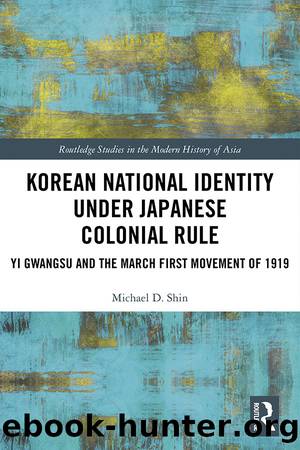Korean National Identity under Japanese Colonial Rule by Shin Michael;

Author:Shin, Michael;
Language: eng
Format: epub
Publisher: Taylor & Francis Group
Published: 2018-03-22T00:00:00+00:00
Colonial ethnology
As Edward Said has noted, âof all the modern social sciences, anthropology is the one historically most closely tied to colonialism,â even having been called the âhandmaiden of colonialism.â40 Imperial powers valued anthropologyâmore specifically, ethnographyâfor its ability to provide knowledge of colonial peoples. What the study of colonial societies shared with other aspects of imperialism was its extractive nature; just as economic institutions extracted resources from the colonies, research apparatuses extracted knowledge. Japan was no exception, and it devoted significant resources to conducting research on Joseon even before the occupation began. During the occupation period, there was no one office that was in charge of government research. Like all modern bureaucracies, apparatuses for collecting information were built into the normal functioning of the state. The nature of bureaucracy enabled the colonial state to take a flexible approach, establishing offices to supervise, organize, and publish research when necessary and abolishing them after they had served their purpose.
Paralleling the development of governmentality, the focus of information collection was initially the economy, but with the change to the Cultural Policy after 1919, more attention was devoted to culture, that is, the spiritual life and ethnic identity of the Joseon people. Ethnographic research by the colonial state constituted âJoseon cultureâ as a distinct object of knowledge; its aim was not simply to justify Japanâs occupation but also to define new targets for colonial power.
After the opening of Joseon in 1876, Japanese merchants and the military began to gather information as they moved around the country, occasionally publishing their findings. The military naturally focused on Joseonâs geography, and merchants wanted to know about economic customs. Around the turn of the century, a number of organizations were formed that were dedicated to doing research on Japanâs neighboring countries. They were quasi-governmental in nature as they had current or former government employees among their members and sometimes received financial support from the government.41 The next stage in research on Joseon began with the establishment of the Research Bureau of the South Manchurian Railway (SMR) in 1907. As is well known, the SMR served a vanguard role in the expansion of Japanese power in Northeast Asia, and the purpose of the Research Bureau was to provide information on traditional local customs and economic activities. It was significant because it brought in professional academics from elite universities to conduct and supervise its research activities. For example, at the suggestion of Shiratori Kurakichi (1865â1942), a historian of premodern East Asia at Tokyo Imperial University, the Research Bureau established the Center for Historical and Geographic Research on Manchuria and Joseon (J. Mansen rekishi chiri chÅsabu) in Tokyo in 1908. As the head of the center, Shiratori brought in several of his students, some of whom later worked for the colonial government.42 Through their research, Japanese ethnology began to become more directly connected with administrative practice in the colonies.
After Joseon became a Japanese protectorate in 1905, the state began to assume a more direct role in collecting data on Joseon, focusing on creating the legal mechanisms necessary to intervene in the economy.
Download
This site does not store any files on its server. We only index and link to content provided by other sites. Please contact the content providers to delete copyright contents if any and email us, we'll remove relevant links or contents immediately.
| Anthropology | Archaeology |
| Philosophy | Politics & Government |
| Social Sciences | Sociology |
| Women's Studies |
Cecilia; Or, Memoirs of an Heiress — Volume 1 by Fanny Burney(32081)
Cecilia; Or, Memoirs of an Heiress — Volume 3 by Fanny Burney(31471)
Cecilia; Or, Memoirs of an Heiress — Volume 2 by Fanny Burney(31425)
The Great Music City by Andrea Baker(30809)
We're Going to Need More Wine by Gabrielle Union(18649)
All the Missing Girls by Megan Miranda(14810)
Pimp by Iceberg Slim(13809)
Bombshells: Glamour Girls of a Lifetime by Sullivan Steve(13706)
Fifty Shades Freed by E L James(12930)
Talking to Strangers by Malcolm Gladwell(12899)
Norse Mythology by Gaiman Neil(12867)
For the Love of Europe by Rick Steves(11592)
Crazy Rich Asians by Kevin Kwan(8903)
Mindhunter: Inside the FBI's Elite Serial Crime Unit by John E. Douglas & Mark Olshaker(8727)
The Lost Art of Listening by Michael P. Nichols(7178)
Enlightenment Now: The Case for Reason, Science, Humanism, and Progress by Steven Pinker(6885)
The Four Agreements by Don Miguel Ruiz(6330)
Bad Blood by John Carreyrou(6286)
Weapons of Math Destruction by Cathy O'Neil(5855)
